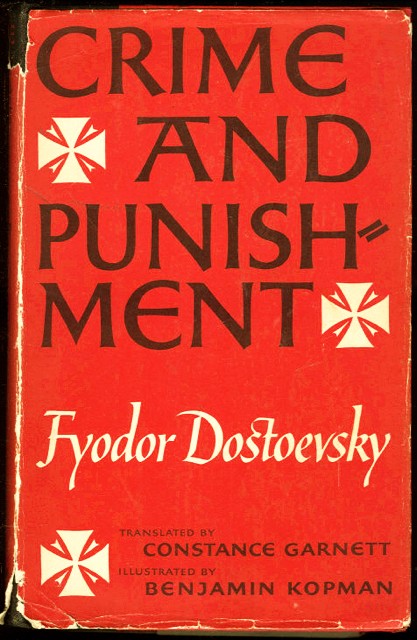The dilema of Crime and Punishment
- 10 de out. de 2016
- 3 min de leitura
“I wanted to make myself a Napoleon, and that is why I killed her…” This is the confession of Raskólnikov, antihero of Fyodor Dostoevsky’s Crime and Punishment. But what does he mean? Readers of this Russian classic witness the murder of moneylender Alena Ivanovna--from its inception as an idea to the act itself--early in the novel. Still, a delicious mystery unfolds with the introduction of each new participant in the investigation. Is Raskólnikov desperate? Mad? Evil? Is he, like Napoleon, a conqueror of old ways and ideas?
[This Article was first published at About Education by Janeen Keelan]
Raskólnikov is a poor former student, and the murder first presents itself as a robbery. Ivanovna, we are told, has resources enough to raise whole families out of poverty, but hoards her money and prospers by the misfortune of others. Raskólnikov is destitute, hungry and lives in shame off his poor mother and sister. During the murder askólnikov fails to access Ivanovna's savings, though he knows of it and holds the key to it in his hand.
He takes a wallet from Ivanovna's person and manages to steal a handful of trinkets before fleeing the scene, but buries these under a rock across town without even a perfunctory inspection. Whenever a rouble comes to him he relieves himself of it through charity, or by throwing it into the river. Whatever his motive, it isn't money. What Others Perceive of Motive: Crime and Punishment
Zosímov, Raskólnikov's doctor, is sure the man is mad. His diagnoses are hypochondria and megalomania--characterized by delusions of grandeur, fitting with the drive to make himself a Napoleon. There are ways in which Raskólnikov’s humility contradicts this diagnosis. It is up to his friend Razumíkhin, for example, to inform us that he once risked his life to rescue children from a burning home, that he had sacrificed much to help a poor fellow student through school.
Modern readers may infer schizophrenia from Raskólnikov’s moods, mutterings and dissociation. Long periods of activity that he retains no memory of would support this armchair diagnosis. The murder is planned and executed while Raskólnikov is lucid, however, and assuagement of guilt--which, combined with the love of God and a good woman, ostensibly saves Raskólnikov--is still not a clinically proven cure for insanity. Salvation for a Murderer?: Crime and Punishment Do God’s light and the alleviation of guilt really save Raskólnikov? If so, the question of motive is simple. He had, by his own confession, "an evil heart." If Satan had you, what would he have you do? Murder, that's what.
It would be easy to relegate Crime and Punishment to that collection of morality tales posing as literary classics. Raskólnikov literally bears a cross for his confession. His final act in the novel is to pick up a Bible with an idea that the belief of his beloved could become his belief. Yet doesn't that mean he doesn't yet hold these beliefs? He never denounces murder, and his last words on the subject reveal that his emotional anguish was not due to guilt but to shame--not that the murder was wrong but that it was poorly executed, that the "point" was lost.
This "point" brings us to the belief held by Porfíry Petróvich, the examining magistrate in the murder investigation. This kind-hearted and seemingly ineffectual investigator (think television's Columbo) believes that theory motivated Ivanovna’s murder. Petróvich’s belief is supported by an article, written by Raskólnikov when he was a student and published without his knowledge, that assigns mankind into two categories: the masses, for whom laws are written; and great men, men of ideas, whose power puts them beyond the laws of God and man. If Petróvich’s (and Raskólnikov's) theory explains the murder of Alena Ivanovna, what is this motivating "idea"--that she should die for being rich and mean? That harm could be prevented by her demise? For that matter, what great "idea" motivated Napoleon, apart from acquisition of territory and title? If Raskólnikov acted on his own theory, perhaps it's neither the crime nor its awkward execution that brings him anguish. Perhaps it's his failure to produce an interesting and original motive.
[This Article was first published at About Education by Janeen Keelan]








![[Spoiler Alert] A Study in A Study in Scarlet](https://static.wixstatic.com/media/7d540d_863abd4af6e541b6ac71310b4d0373f3~mv2.jpg/v1/fill/w_306,h_250,fp_0.50_0.50,q_30,blur_30,enc_avif,quality_auto/7d540d_863abd4af6e541b6ac71310b4d0373f3~mv2.webp)
![[Spoiler Alert] A Study in A Study in Scarlet](https://static.wixstatic.com/media/7d540d_863abd4af6e541b6ac71310b4d0373f3~mv2.jpg/v1/fill/w_38,h_31,fp_0.50_0.50,q_90,enc_avif,quality_auto/7d540d_863abd4af6e541b6ac71310b4d0373f3~mv2.webp)











![[Spoiler Alert] Pride & Prejudice in cartoon!](https://static.wixstatic.com/media/7d540d_d3e028e34a7943e69cffe12928adb56a~mv2.png/v1/fill/w_216,h_244,fp_0.50_0.50,lg_1,q_35,blur_30,enc_avif,quality_auto/7d540d_d3e028e34a7943e69cffe12928adb56a~mv2.webp)
![[Spoiler Alert] Pride & Prejudice in cartoon!](https://static.wixstatic.com/media/7d540d_d3e028e34a7943e69cffe12928adb56a~mv2.png/v1/fill/w_38,h_43,fp_0.50_0.50,q_95,enc_avif,quality_auto/7d540d_d3e028e34a7943e69cffe12928adb56a~mv2.webp)


![[Infographic] What happens to you after reading a book](https://static.wixstatic.com/media/7d540d_c816bfe519ff4072b028779065295d34~mv2.jpg/v1/fill/w_339,h_250,fp_0.50_0.50,q_30,blur_30,enc_avif,quality_auto/7d540d_c816bfe519ff4072b028779065295d34~mv2.webp)
![[Infographic] What happens to you after reading a book](https://static.wixstatic.com/media/7d540d_c816bfe519ff4072b028779065295d34~mv2.jpg/v1/fill/w_38,h_28,fp_0.50_0.50,q_90,enc_avif,quality_auto/7d540d_c816bfe519ff4072b028779065295d34~mv2.webp)
Comentários